An Analysis of Entrepreneurial Ventures, Typologies, and Economy
VerifiedAdded on 2022/11/25
|17
|4456
|1
Report
AI Summary
This report provides an in-depth analysis of various entrepreneurial ventures, encompassing small, large, and social enterprises, and their corresponding typologies, such as lifestyle and growth enterprises. It delves into the similarities and differences between these ventures, highlighting their operational characteristics, objectives, and societal contributions. The report further investigates the impact of micro and small businesses on the economy, examining their influence at local, national, and regional levels, and their role in generating employment and fostering economic development. Additionally, the report emphasizes the significance of small businesses and start-ups in driving social economy growth, emphasizing their contributions to job creation, economic expansion, and enhancing the standard of living. The report also covers the role of entrepreneurs in the economy.

Entrepreneur and
venture
venture
Paraphrase This Document
Need a fresh take? Get an instant paraphrase of this document with our AI Paraphraser
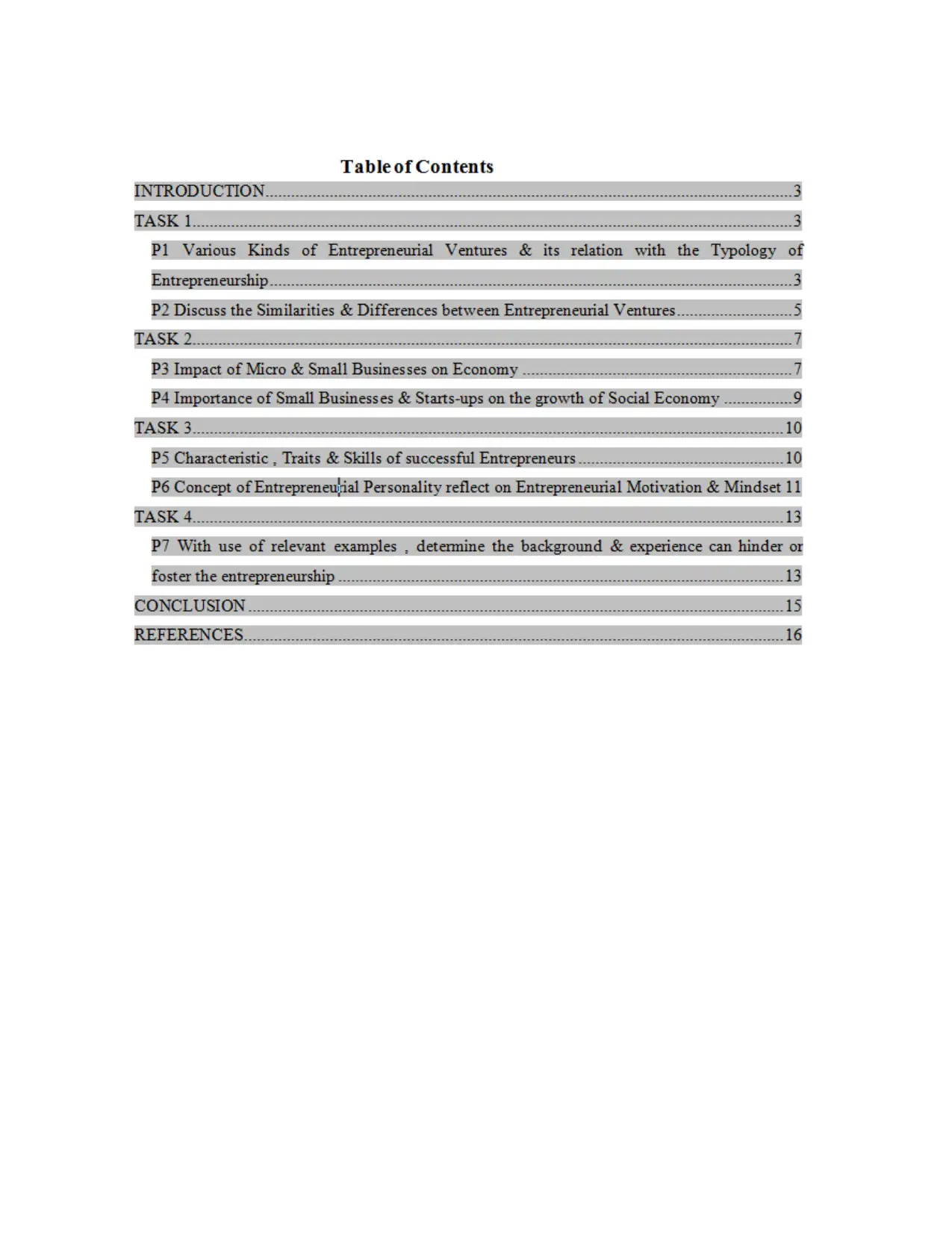
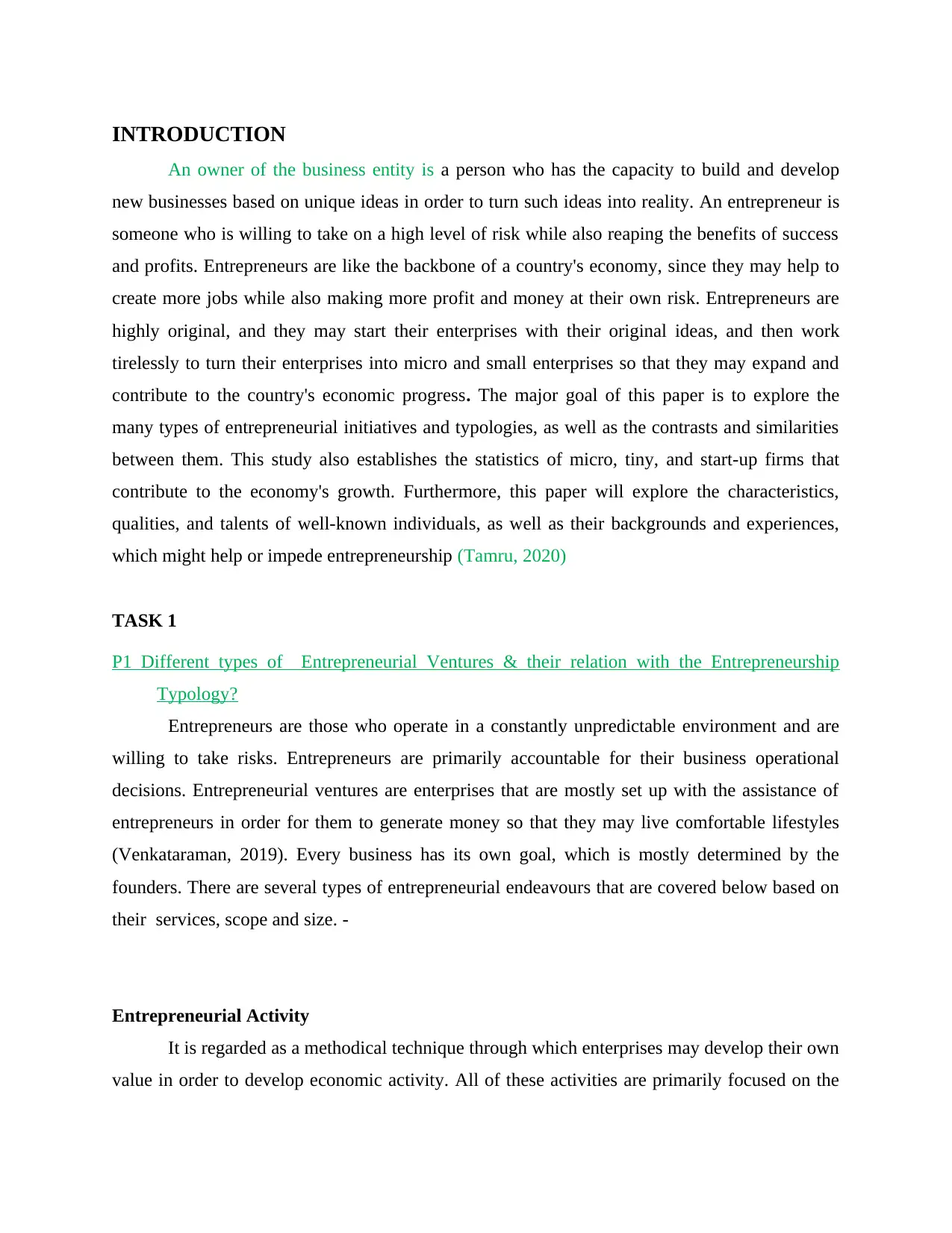
INTRODUCTION
An owner of the business entity is a person who has the capacity to build and develop
new businesses based on unique ideas in order to turn such ideas into reality. An entrepreneur is
someone who is willing to take on a high level of risk while also reaping the benefits of success
and profits. Entrepreneurs are like the backbone of a country's economy, since they may help to
create more jobs while also making more profit and money at their own risk. Entrepreneurs are
highly original, and they may start their enterprises with their original ideas, and then work
tirelessly to turn their enterprises into micro and small enterprises so that they may expand and
contribute to the country's economic progress. The major goal of this paper is to explore the
many types of entrepreneurial initiatives and typologies, as well as the contrasts and similarities
between them. This study also establishes the statistics of micro, tiny, and start-up firms that
contribute to the economy's growth. Furthermore, this paper will explore the characteristics,
qualities, and talents of well-known individuals, as well as their backgrounds and experiences,
which might help or impede entrepreneurship (Tamru, 2020)
TASK 1
P1 Different types of Entrepreneurial Ventures & their relation with the Entrepreneurship
Typology?
Entrepreneurs are those who operate in a constantly unpredictable environment and are
willing to take risks. Entrepreneurs are primarily accountable for their business operational
decisions. Entrepreneurial ventures are enterprises that are mostly set up with the assistance of
entrepreneurs in order for them to generate money so that they may live comfortable lifestyles
(Venkataraman, 2019). Every business has its own goal, which is mostly determined by the
founders. There are several types of entrepreneurial endeavours that are covered below based on
their services, scope and size. -
Entrepreneurial Activity
It is regarded as a methodical technique through which enterprises may develop their own
value in order to develop economic activity. All of these activities are primarily focused on the
An owner of the business entity is a person who has the capacity to build and develop
new businesses based on unique ideas in order to turn such ideas into reality. An entrepreneur is
someone who is willing to take on a high level of risk while also reaping the benefits of success
and profits. Entrepreneurs are like the backbone of a country's economy, since they may help to
create more jobs while also making more profit and money at their own risk. Entrepreneurs are
highly original, and they may start their enterprises with their original ideas, and then work
tirelessly to turn their enterprises into micro and small enterprises so that they may expand and
contribute to the country's economic progress. The major goal of this paper is to explore the
many types of entrepreneurial initiatives and typologies, as well as the contrasts and similarities
between them. This study also establishes the statistics of micro, tiny, and start-up firms that
contribute to the economy's growth. Furthermore, this paper will explore the characteristics,
qualities, and talents of well-known individuals, as well as their backgrounds and experiences,
which might help or impede entrepreneurship (Tamru, 2020)
TASK 1
P1 Different types of Entrepreneurial Ventures & their relation with the Entrepreneurship
Typology?
Entrepreneurs are those who operate in a constantly unpredictable environment and are
willing to take risks. Entrepreneurs are primarily accountable for their business operational
decisions. Entrepreneurial ventures are enterprises that are mostly set up with the assistance of
entrepreneurs in order for them to generate money so that they may live comfortable lifestyles
(Venkataraman, 2019). Every business has its own goal, which is mostly determined by the
founders. There are several types of entrepreneurial endeavours that are covered below based on
their services, scope and size. -
Entrepreneurial Activity
It is regarded as a methodical technique through which enterprises may develop their own
value in order to develop economic activity. All of these activities are primarily focused on the
⊘ This is a preview!⊘
Do you want full access?
Subscribe today to unlock all pages.

Trusted by 1+ million students worldwide
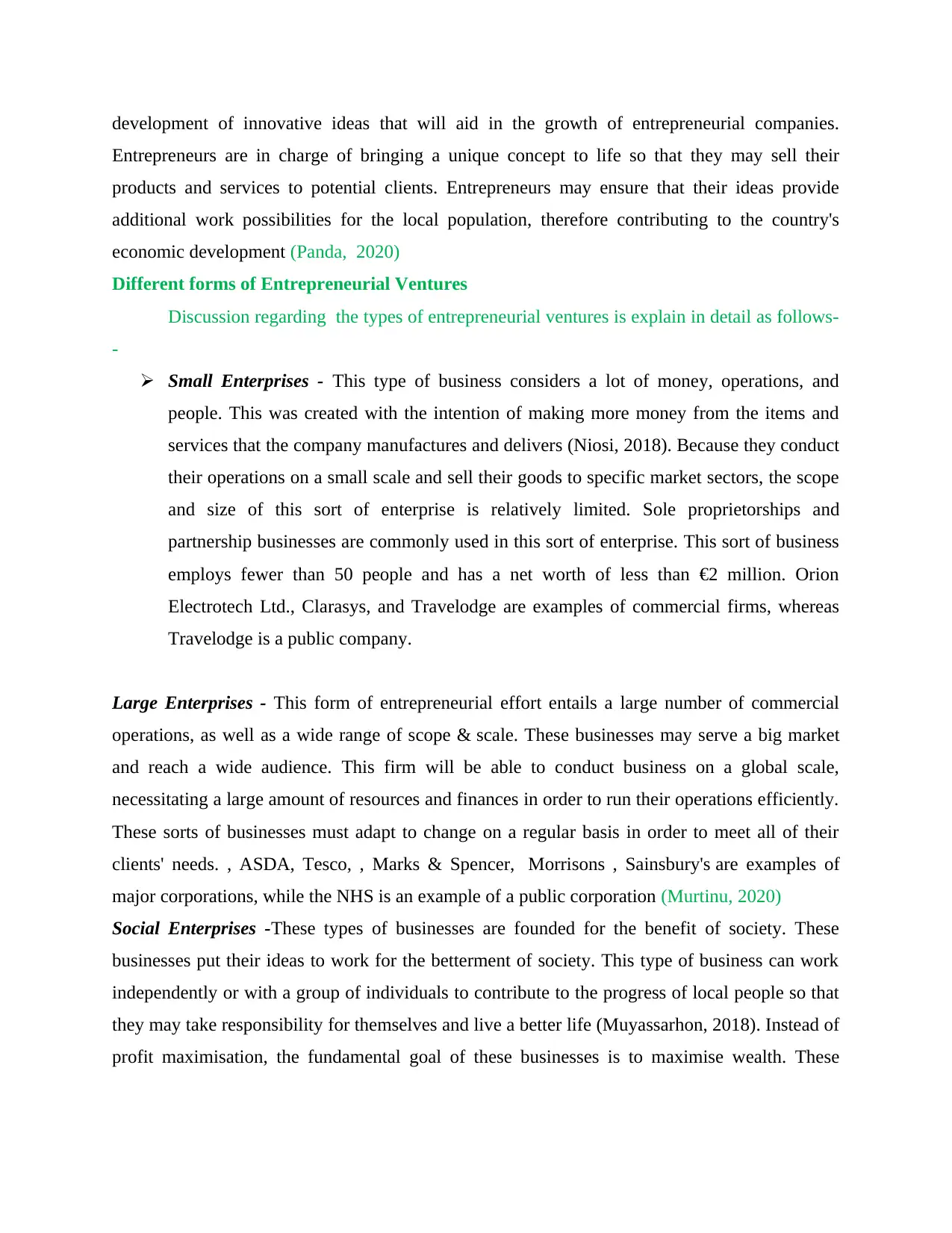
development of innovative ideas that will aid in the growth of entrepreneurial companies.
Entrepreneurs are in charge of bringing a unique concept to life so that they may sell their
products and services to potential clients. Entrepreneurs may ensure that their ideas provide
additional work possibilities for the local population, therefore contributing to the country's
economic development (Panda, 2020)
Different forms of Entrepreneurial Ventures
Discussion regarding the types of entrepreneurial ventures is explain in detail as follows-
-
Small Enterprises - This type of business considers a lot of money, operations, and
people. This was created with the intention of making more money from the items and
services that the company manufactures and delivers (Niosi, 2018). Because they conduct
their operations on a small scale and sell their goods to specific market sectors, the scope
and size of this sort of enterprise is relatively limited. Sole proprietorships and
partnership businesses are commonly used in this sort of enterprise. This sort of business
employs fewer than 50 people and has a net worth of less than €2 million. Orion
Electrotech Ltd., Clarasys, and Travelodge are examples of commercial firms, whereas
Travelodge is a public company.
Large Enterprises - This form of entrepreneurial effort entails a large number of commercial
operations, as well as a wide range of scope & scale. These businesses may serve a big market
and reach a wide audience. This firm will be able to conduct business on a global scale,
necessitating a large amount of resources and finances in order to run their operations efficiently.
These sorts of businesses must adapt to change on a regular basis in order to meet all of their
clients' needs. , ASDA, Tesco, , Marks & Spencer, Morrisons , Sainsbury's are examples of
major corporations, while the NHS is an example of a public corporation (Murtinu, 2020)
Social Enterprises -These types of businesses are founded for the benefit of society. These
businesses put their ideas to work for the betterment of society. This type of business can work
independently or with a group of individuals to contribute to the progress of local people so that
they may take responsibility for themselves and live a better life (Muyassarhon, 2018). Instead of
profit maximisation, the fundamental goal of these businesses is to maximise wealth. These
Entrepreneurs are in charge of bringing a unique concept to life so that they may sell their
products and services to potential clients. Entrepreneurs may ensure that their ideas provide
additional work possibilities for the local population, therefore contributing to the country's
economic development (Panda, 2020)
Different forms of Entrepreneurial Ventures
Discussion regarding the types of entrepreneurial ventures is explain in detail as follows-
-
Small Enterprises - This type of business considers a lot of money, operations, and
people. This was created with the intention of making more money from the items and
services that the company manufactures and delivers (Niosi, 2018). Because they conduct
their operations on a small scale and sell their goods to specific market sectors, the scope
and size of this sort of enterprise is relatively limited. Sole proprietorships and
partnership businesses are commonly used in this sort of enterprise. This sort of business
employs fewer than 50 people and has a net worth of less than €2 million. Orion
Electrotech Ltd., Clarasys, and Travelodge are examples of commercial firms, whereas
Travelodge is a public company.
Large Enterprises - This form of entrepreneurial effort entails a large number of commercial
operations, as well as a wide range of scope & scale. These businesses may serve a big market
and reach a wide audience. This firm will be able to conduct business on a global scale,
necessitating a large amount of resources and finances in order to run their operations efficiently.
These sorts of businesses must adapt to change on a regular basis in order to meet all of their
clients' needs. , ASDA, Tesco, , Marks & Spencer, Morrisons , Sainsbury's are examples of
major corporations, while the NHS is an example of a public corporation (Murtinu, 2020)
Social Enterprises -These types of businesses are founded for the benefit of society. These
businesses put their ideas to work for the betterment of society. This type of business can work
independently or with a group of individuals to contribute to the progress of local people so that
they may take responsibility for themselves and live a better life (Muyassarhon, 2018). Instead of
profit maximisation, the fundamental goal of these businesses is to maximise wealth. These
Paraphrase This Document
Need a fresh take? Get an instant paraphrase of this document with our AI Paraphraser
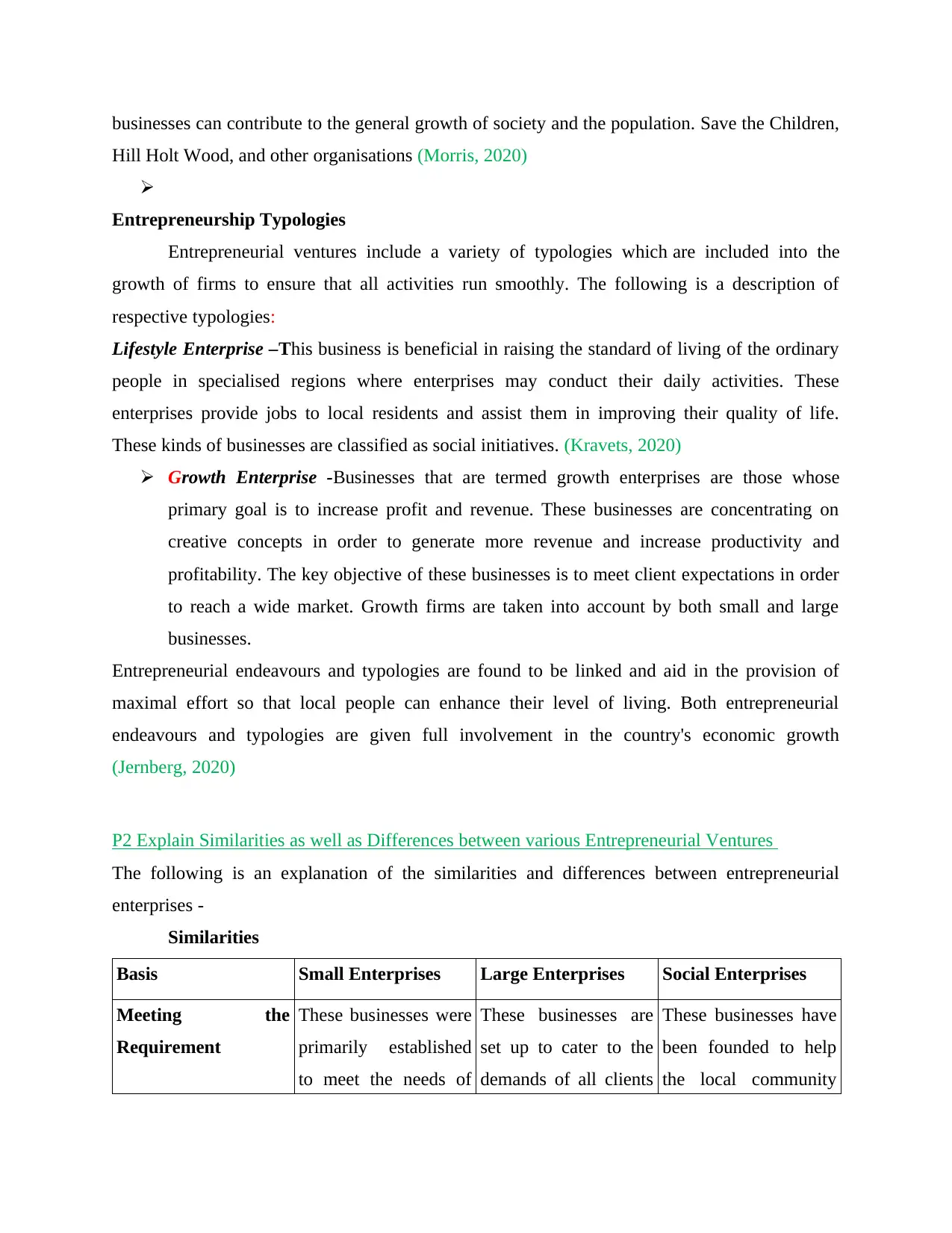
businesses can contribute to the general growth of society and the population. Save the Children,
Hill Holt Wood, and other organisations (Morris, 2020)
Entrepreneurship Typologies
Entrepreneurial ventures include a variety of typologies which are included into the
growth of firms to ensure that all activities run smoothly. The following is a description of
respective typologies:
Lifestyle Enterprise –This business is beneficial in raising the standard of living of the ordinary
people in specialised regions where enterprises may conduct their daily activities. These
enterprises provide jobs to local residents and assist them in improving their quality of life.
These kinds of businesses are classified as social initiatives. (Kravets, 2020)
Growth Enterprise -Businesses that are termed growth enterprises are those whose
primary goal is to increase profit and revenue. These businesses are concentrating on
creative concepts in order to generate more revenue and increase productivity and
profitability. The key objective of these businesses is to meet client expectations in order
to reach a wide market. Growth firms are taken into account by both small and large
businesses.
Entrepreneurial endeavours and typologies are found to be linked and aid in the provision of
maximal effort so that local people can enhance their level of living. Both entrepreneurial
endeavours and typologies are given full involvement in the country's economic growth
(Jernberg, 2020)
P2 Explain Similarities as well as Differences between various Entrepreneurial Ventures
The following is an explanation of the similarities and differences between entrepreneurial
enterprises -
Similarities
Basis Small Enterprises Large Enterprises Social Enterprises
Meeting the
Requirement
These businesses were
primarily established
to meet the needs of
These businesses are
set up to cater to the
demands of all clients
These businesses have
been founded to help
the local community
Hill Holt Wood, and other organisations (Morris, 2020)
Entrepreneurship Typologies
Entrepreneurial ventures include a variety of typologies which are included into the
growth of firms to ensure that all activities run smoothly. The following is a description of
respective typologies:
Lifestyle Enterprise –This business is beneficial in raising the standard of living of the ordinary
people in specialised regions where enterprises may conduct their daily activities. These
enterprises provide jobs to local residents and assist them in improving their quality of life.
These kinds of businesses are classified as social initiatives. (Kravets, 2020)
Growth Enterprise -Businesses that are termed growth enterprises are those whose
primary goal is to increase profit and revenue. These businesses are concentrating on
creative concepts in order to generate more revenue and increase productivity and
profitability. The key objective of these businesses is to meet client expectations in order
to reach a wide market. Growth firms are taken into account by both small and large
businesses.
Entrepreneurial endeavours and typologies are found to be linked and aid in the provision of
maximal effort so that local people can enhance their level of living. Both entrepreneurial
endeavours and typologies are given full involvement in the country's economic growth
(Jernberg, 2020)
P2 Explain Similarities as well as Differences between various Entrepreneurial Ventures
The following is an explanation of the similarities and differences between entrepreneurial
enterprises -
Similarities
Basis Small Enterprises Large Enterprises Social Enterprises
Meeting the
Requirement
These businesses were
primarily established
to meet the needs of
These businesses are
set up to cater to the
demands of all clients
These businesses have
been founded to help
the local community
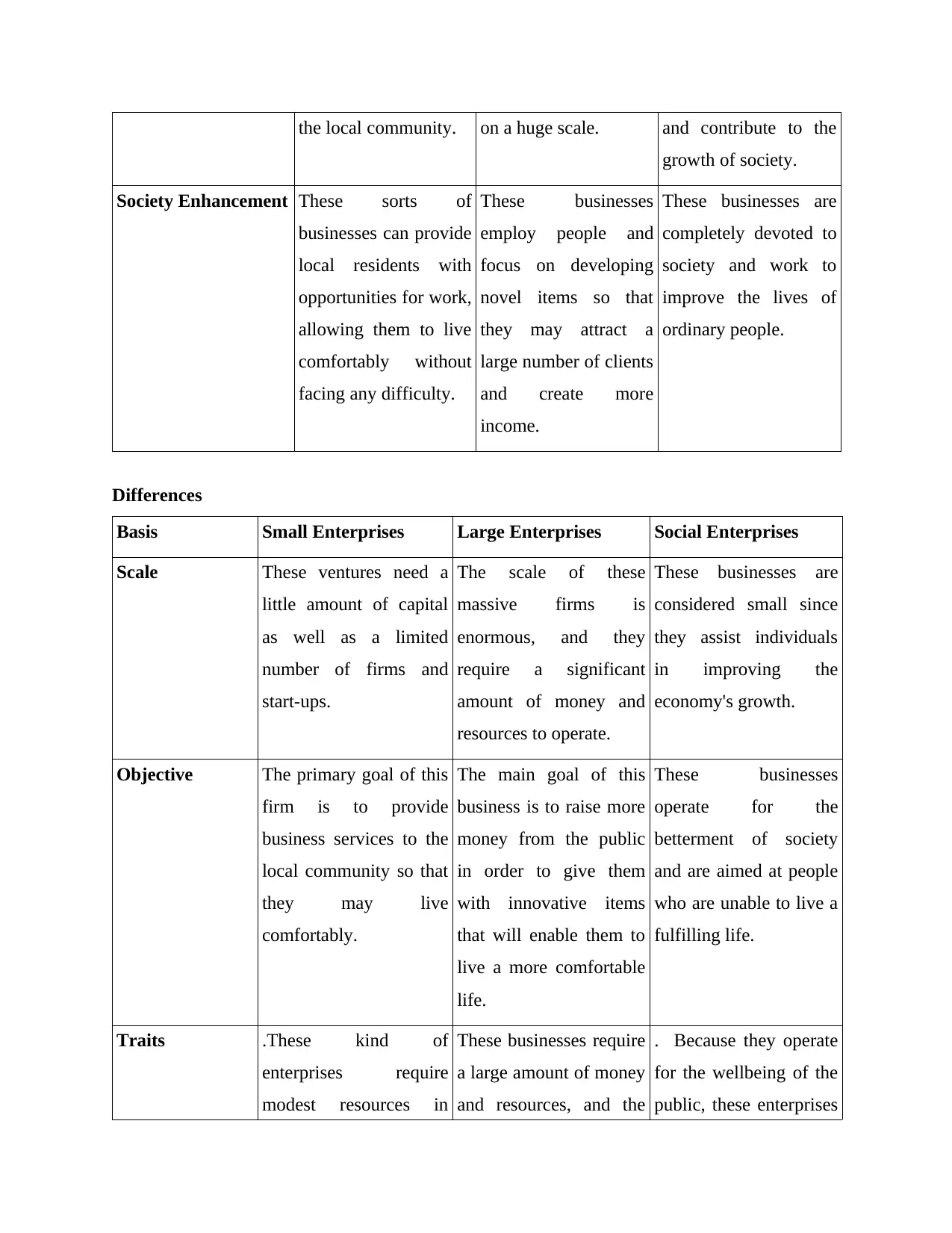
the local community. on a huge scale. and contribute to the
growth of society.
Society Enhancement These sorts of
businesses can provide
local residents with
opportunities for work,
allowing them to live
comfortably without
facing any difficulty.
These businesses
employ people and
focus on developing
novel items so that
they may attract a
large number of clients
and create more
income.
These businesses are
completely devoted to
society and work to
improve the lives of
ordinary people.
Differences
Basis Small Enterprises Large Enterprises Social Enterprises
Scale These ventures need a
little amount of capital
as well as a limited
number of firms and
start-ups.
The scale of these
massive firms is
enormous, and they
require a significant
amount of money and
resources to operate.
These businesses are
considered small since
they assist individuals
in improving the
economy's growth.
Objective The primary goal of this
firm is to provide
business services to the
local community so that
they may live
comfortably.
The main goal of this
business is to raise more
money from the public
in order to give them
with innovative items
that will enable them to
live a more comfortable
life.
These businesses
operate for the
betterment of society
and are aimed at people
who are unable to live a
fulfilling life.
Traits .These kind of
enterprises require
modest resources in
These businesses require
a large amount of money
and resources, and the
. Because they operate
for the wellbeing of the
public, these enterprises
growth of society.
Society Enhancement These sorts of
businesses can provide
local residents with
opportunities for work,
allowing them to live
comfortably without
facing any difficulty.
These businesses
employ people and
focus on developing
novel items so that
they may attract a
large number of clients
and create more
income.
These businesses are
completely devoted to
society and work to
improve the lives of
ordinary people.
Differences
Basis Small Enterprises Large Enterprises Social Enterprises
Scale These ventures need a
little amount of capital
as well as a limited
number of firms and
start-ups.
The scale of these
massive firms is
enormous, and they
require a significant
amount of money and
resources to operate.
These businesses are
considered small since
they assist individuals
in improving the
economy's growth.
Objective The primary goal of this
firm is to provide
business services to the
local community so that
they may live
comfortably.
The main goal of this
business is to raise more
money from the public
in order to give them
with innovative items
that will enable them to
live a more comfortable
life.
These businesses
operate for the
betterment of society
and are aimed at people
who are unable to live a
fulfilling life.
Traits .These kind of
enterprises require
modest resources in
These businesses require
a large amount of money
and resources, and the
. Because they operate
for the wellbeing of the
public, these enterprises
⊘ This is a preview!⊘
Do you want full access?
Subscribe today to unlock all pages.

Trusted by 1+ million students worldwide
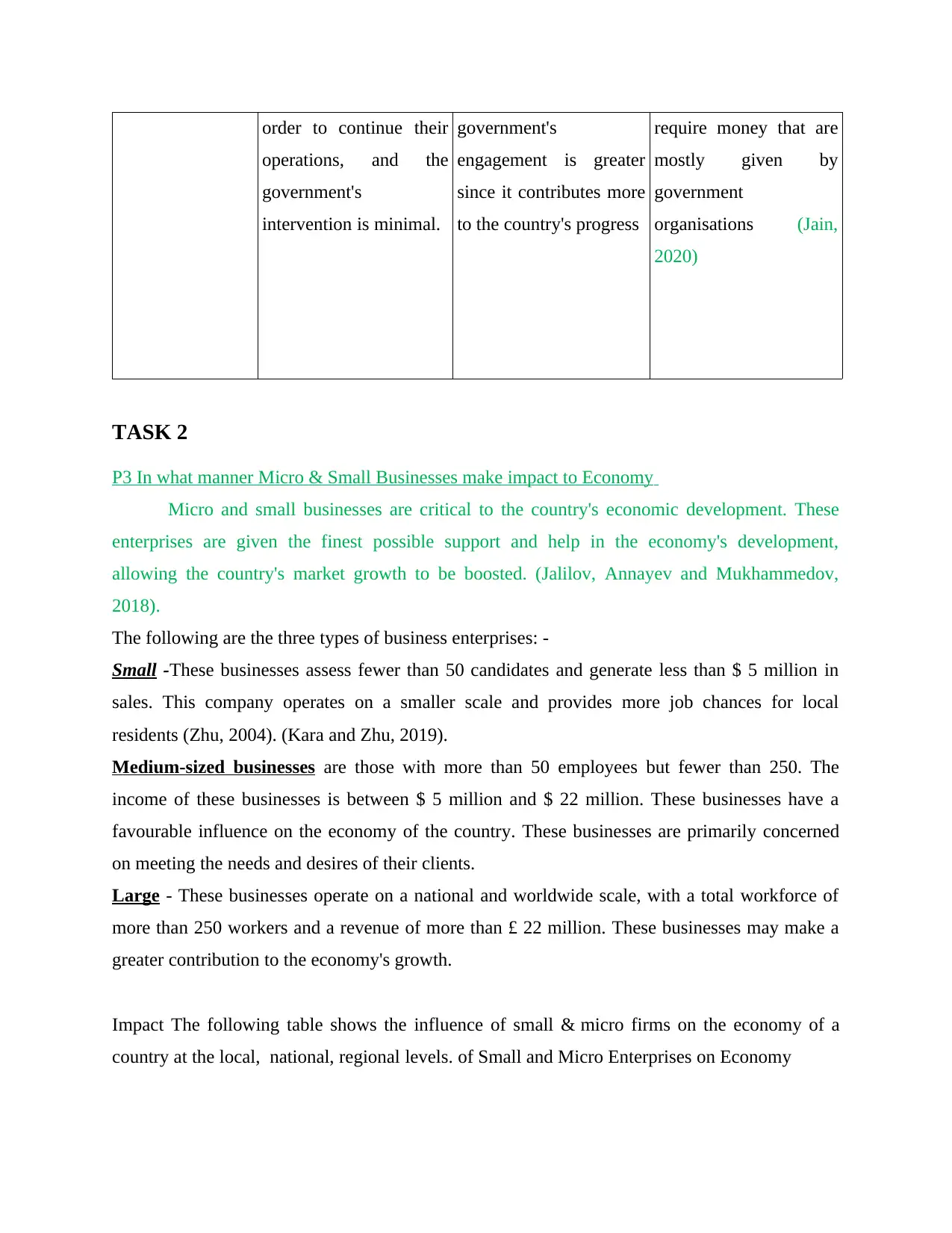
order to continue their
operations, and the
government's
intervention is minimal.
government's
engagement is greater
since it contributes more
to the country's progress
require money that are
mostly given by
government
organisations (Jain,
2020)
TASK 2
P3 In what manner Micro & Small Businesses make impact to Economy
Micro and small businesses are critical to the country's economic development. These
enterprises are given the finest possible support and help in the economy's development,
allowing the country's market growth to be boosted. (Jalilov, Annayev and Mukhammedov,
2018).
The following are the three types of business enterprises: -
Small -These businesses assess fewer than 50 candidates and generate less than $ 5 million in
sales. This company operates on a smaller scale and provides more job chances for local
residents (Zhu, 2004). (Kara and Zhu, 2019).
Medium-sized businesses are those with more than 50 employees but fewer than 250. The
income of these businesses is between $ 5 million and $ 22 million. These businesses have a
favourable influence on the economy of the country. These businesses are primarily concerned
on meeting the needs and desires of their clients.
Large - These businesses operate on a national and worldwide scale, with a total workforce of
more than 250 workers and a revenue of more than £ 22 million. These businesses may make a
greater contribution to the economy's growth.
Impact The following table shows the influence of small & micro firms on the economy of a
country at the local, national, regional levels. of Small and Micro Enterprises on Economy
operations, and the
government's
intervention is minimal.
government's
engagement is greater
since it contributes more
to the country's progress
require money that are
mostly given by
government
organisations (Jain,
2020)
TASK 2
P3 In what manner Micro & Small Businesses make impact to Economy
Micro and small businesses are critical to the country's economic development. These
enterprises are given the finest possible support and help in the economy's development,
allowing the country's market growth to be boosted. (Jalilov, Annayev and Mukhammedov,
2018).
The following are the three types of business enterprises: -
Small -These businesses assess fewer than 50 candidates and generate less than $ 5 million in
sales. This company operates on a smaller scale and provides more job chances for local
residents (Zhu, 2004). (Kara and Zhu, 2019).
Medium-sized businesses are those with more than 50 employees but fewer than 250. The
income of these businesses is between $ 5 million and $ 22 million. These businesses have a
favourable influence on the economy of the country. These businesses are primarily concerned
on meeting the needs and desires of their clients.
Large - These businesses operate on a national and worldwide scale, with a total workforce of
more than 250 workers and a revenue of more than £ 22 million. These businesses may make a
greater contribution to the economy's growth.
Impact The following table shows the influence of small & micro firms on the economy of a
country at the local, national, regional levels. of Small and Micro Enterprises on Economy
Paraphrase This Document
Need a fresh take? Get an instant paraphrase of this document with our AI Paraphraser
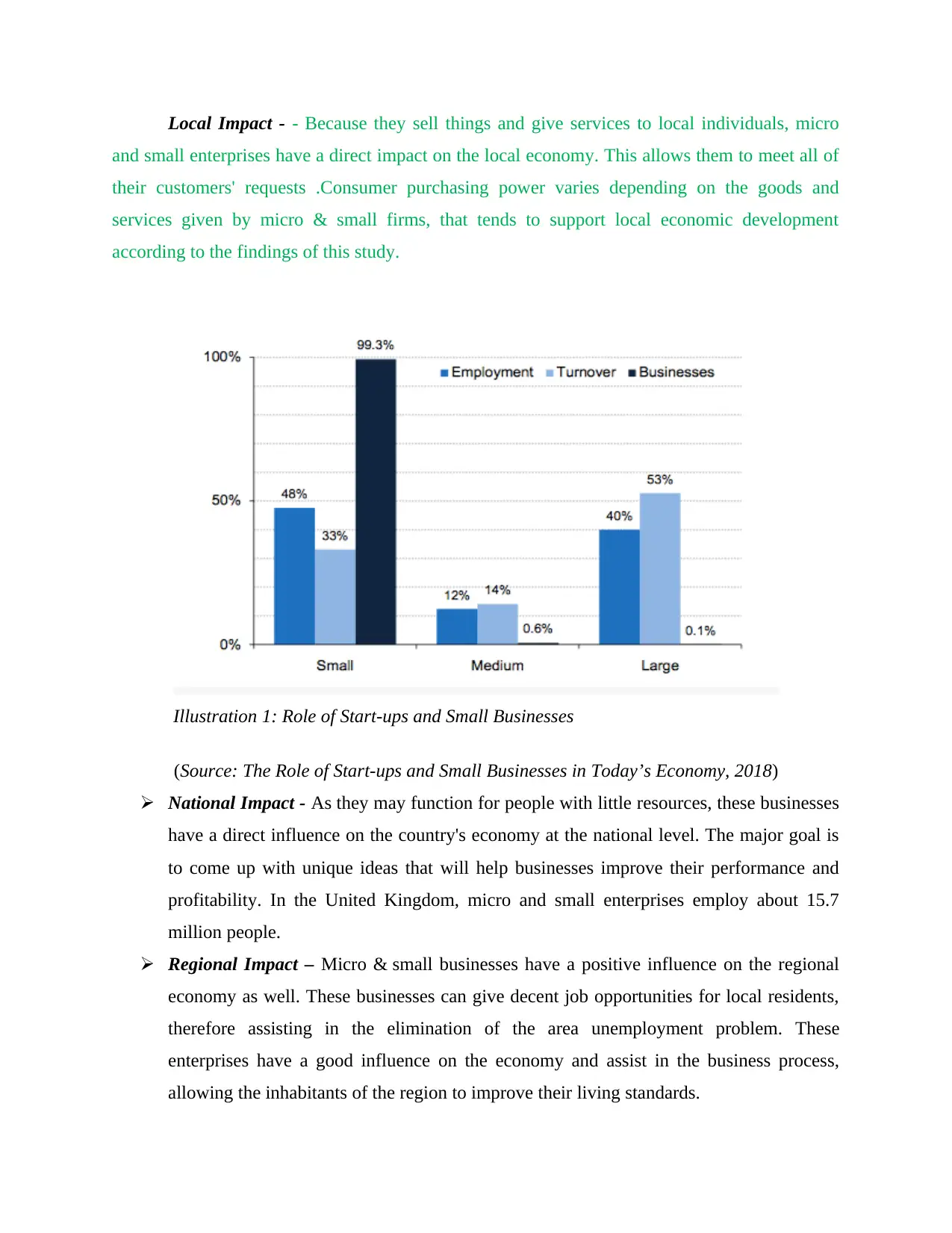
Local Impact - - Because they sell things and give services to local individuals, micro
and small enterprises have a direct impact on the local economy. This allows them to meet all of
their customers' requests .Consumer purchasing power varies depending on the goods and
services given by micro & small firms, that tends to support local economic development
according to the findings of this study.
(Source: The Role of Start-ups and Small Businesses in Today’s Economy, 2018)
National Impact - As they may function for people with little resources, these businesses
have a direct influence on the country's economy at the national level. The major goal is
to come up with unique ideas that will help businesses improve their performance and
profitability. In the United Kingdom, micro and small enterprises employ about 15.7
million people.
Regional Impact – Micro & small businesses have a positive influence on the regional
economy as well. These businesses can give decent job opportunities for local residents,
therefore assisting in the elimination of the area unemployment problem. These
enterprises have a good influence on the economy and assist in the business process,
allowing the inhabitants of the region to improve their living standards.
Illustration 1: Role of Start-ups and Small Businesses
and small enterprises have a direct impact on the local economy. This allows them to meet all of
their customers' requests .Consumer purchasing power varies depending on the goods and
services given by micro & small firms, that tends to support local economic development
according to the findings of this study.
(Source: The Role of Start-ups and Small Businesses in Today’s Economy, 2018)
National Impact - As they may function for people with little resources, these businesses
have a direct influence on the country's economy at the national level. The major goal is
to come up with unique ideas that will help businesses improve their performance and
profitability. In the United Kingdom, micro and small enterprises employ about 15.7
million people.
Regional Impact – Micro & small businesses have a positive influence on the regional
economy as well. These businesses can give decent job opportunities for local residents,
therefore assisting in the elimination of the area unemployment problem. These
enterprises have a good influence on the economy and assist in the business process,
allowing the inhabitants of the region to improve their living standards.
Illustration 1: Role of Start-ups and Small Businesses
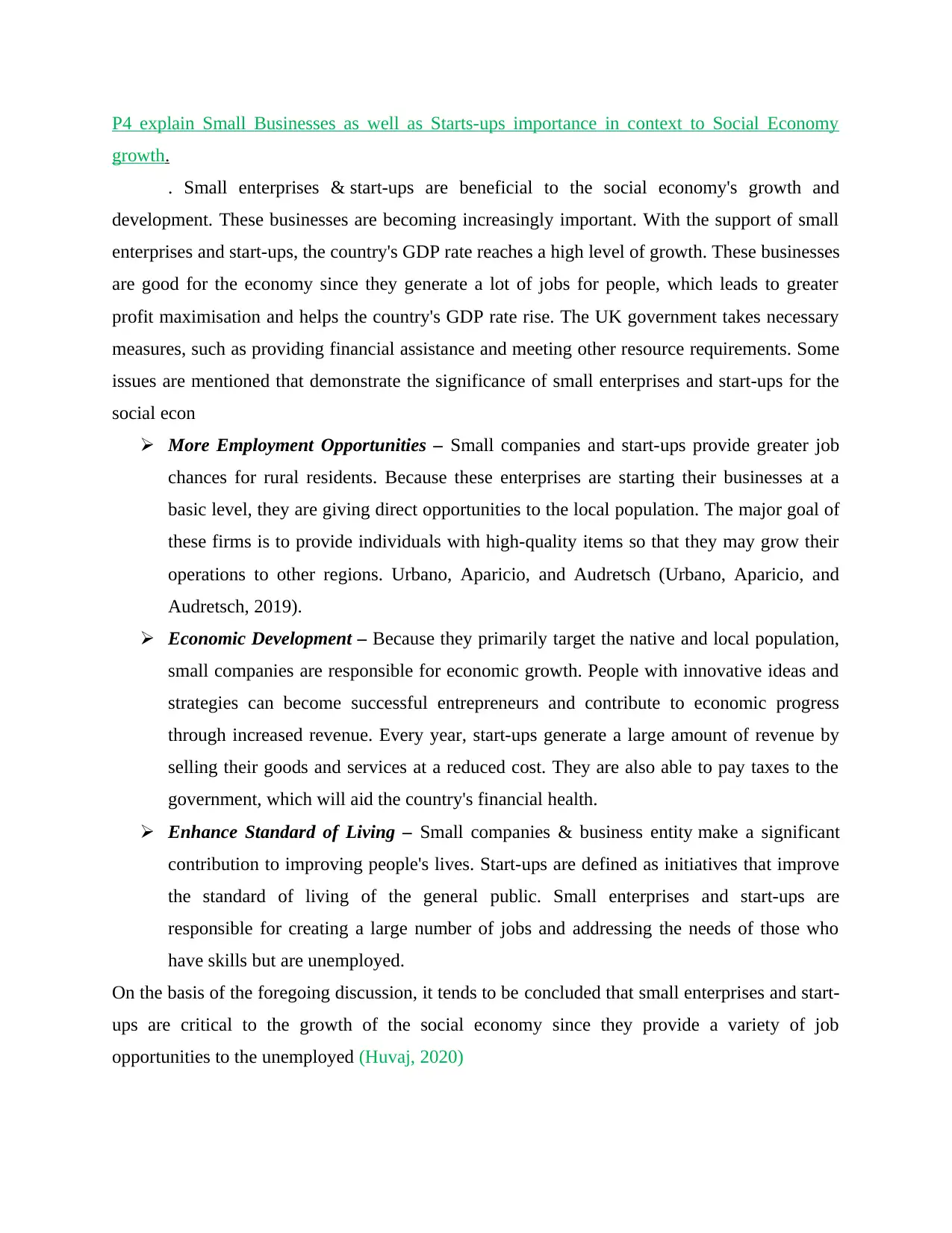
P4 explain Small Businesses as well as Starts-ups importance in context to Social Economy
growth.
. Small enterprises & start-ups are beneficial to the social economy's growth and
development. These businesses are becoming increasingly important. With the support of small
enterprises and start-ups, the country's GDP rate reaches a high level of growth. These businesses
are good for the economy since they generate a lot of jobs for people, which leads to greater
profit maximisation and helps the country's GDP rate rise. The UK government takes necessary
measures, such as providing financial assistance and meeting other resource requirements. Some
issues are mentioned that demonstrate the significance of small enterprises and start-ups for the
social econ
More Employment Opportunities – Small companies and start-ups provide greater job
chances for rural residents. Because these enterprises are starting their businesses at a
basic level, they are giving direct opportunities to the local population. The major goal of
these firms is to provide individuals with high-quality items so that they may grow their
operations to other regions. Urbano, Aparicio, and Audretsch (Urbano, Aparicio, and
Audretsch, 2019).
Economic Development – Because they primarily target the native and local population,
small companies are responsible for economic growth. People with innovative ideas and
strategies can become successful entrepreneurs and contribute to economic progress
through increased revenue. Every year, start-ups generate a large amount of revenue by
selling their goods and services at a reduced cost. They are also able to pay taxes to the
government, which will aid the country's financial health.
Enhance Standard of Living – Small companies & business entity make a significant
contribution to improving people's lives. Start-ups are defined as initiatives that improve
the standard of living of the general public. Small enterprises and start-ups are
responsible for creating a large number of jobs and addressing the needs of those who
have skills but are unemployed.
On the basis of the foregoing discussion, it tends to be concluded that small enterprises and start-
ups are critical to the growth of the social economy since they provide a variety of job
opportunities to the unemployed (Huvaj, 2020)
growth.
. Small enterprises & start-ups are beneficial to the social economy's growth and
development. These businesses are becoming increasingly important. With the support of small
enterprises and start-ups, the country's GDP rate reaches a high level of growth. These businesses
are good for the economy since they generate a lot of jobs for people, which leads to greater
profit maximisation and helps the country's GDP rate rise. The UK government takes necessary
measures, such as providing financial assistance and meeting other resource requirements. Some
issues are mentioned that demonstrate the significance of small enterprises and start-ups for the
social econ
More Employment Opportunities – Small companies and start-ups provide greater job
chances for rural residents. Because these enterprises are starting their businesses at a
basic level, they are giving direct opportunities to the local population. The major goal of
these firms is to provide individuals with high-quality items so that they may grow their
operations to other regions. Urbano, Aparicio, and Audretsch (Urbano, Aparicio, and
Audretsch, 2019).
Economic Development – Because they primarily target the native and local population,
small companies are responsible for economic growth. People with innovative ideas and
strategies can become successful entrepreneurs and contribute to economic progress
through increased revenue. Every year, start-ups generate a large amount of revenue by
selling their goods and services at a reduced cost. They are also able to pay taxes to the
government, which will aid the country's financial health.
Enhance Standard of Living – Small companies & business entity make a significant
contribution to improving people's lives. Start-ups are defined as initiatives that improve
the standard of living of the general public. Small enterprises and start-ups are
responsible for creating a large number of jobs and addressing the needs of those who
have skills but are unemployed.
On the basis of the foregoing discussion, it tends to be concluded that small enterprises and start-
ups are critical to the growth of the social economy since they provide a variety of job
opportunities to the unemployed (Huvaj, 2020)
⊘ This is a preview!⊘
Do you want full access?
Subscribe today to unlock all pages.

Trusted by 1+ million students worldwide
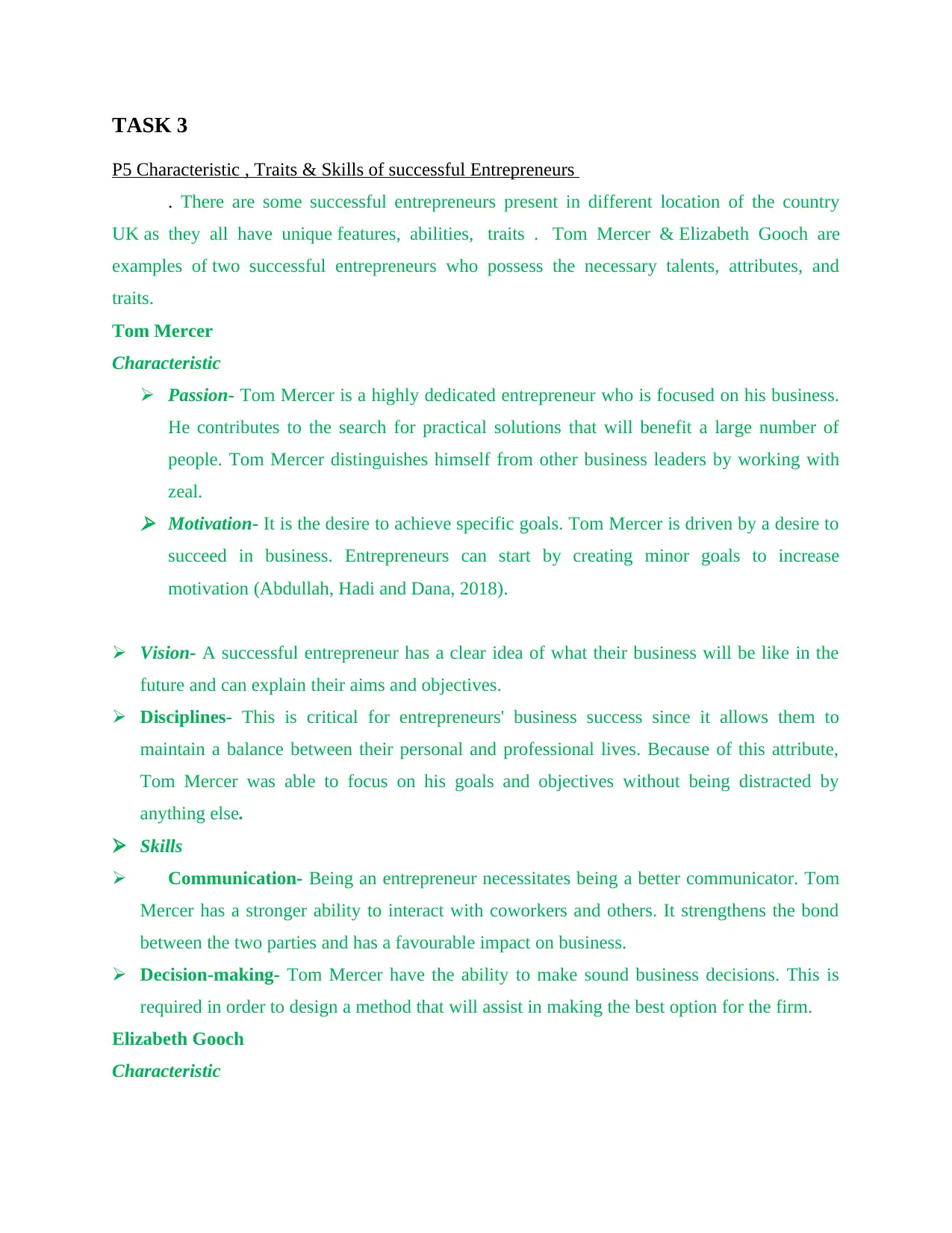
TASK 3
P5 Characteristic , Traits & Skills of successful Entrepreneurs
. There are some successful entrepreneurs present in different location of the country
UK as they all have unique features, abilities, traits . Tom Mercer & Elizabeth Gooch are
examples of two successful entrepreneurs who possess the necessary talents, attributes, and
traits.
Tom Mercer
Characteristic
Passion- Tom Mercer is a highly dedicated entrepreneur who is focused on his business.
He contributes to the search for practical solutions that will benefit a large number of
people. Tom Mercer distinguishes himself from other business leaders by working with
zeal. Motivation- It is the desire to achieve specific goals. Tom Mercer is driven by a desire to
succeed in business. Entrepreneurs can start by creating minor goals to increase
motivation (Abdullah, Hadi and Dana, 2018).
Vision- A successful entrepreneur has a clear idea of what their business will be like in the
future and can explain their aims and objectives.
Disciplines- This is critical for entrepreneurs' business success since it allows them to
maintain a balance between their personal and professional lives. Because of this attribute,
Tom Mercer was able to focus on his goals and objectives without being distracted by
anything else.
Skills
Communication- Being an entrepreneur necessitates being a better communicator. Tom
Mercer has a stronger ability to interact with coworkers and others. It strengthens the bond
between the two parties and has a favourable impact on business.
Decision-making- Tom Mercer have the ability to make sound business decisions. This is
required in order to design a method that will assist in making the best option for the firm.
Elizabeth Gooch
Characteristic
P5 Characteristic , Traits & Skills of successful Entrepreneurs
. There are some successful entrepreneurs present in different location of the country
UK as they all have unique features, abilities, traits . Tom Mercer & Elizabeth Gooch are
examples of two successful entrepreneurs who possess the necessary talents, attributes, and
traits.
Tom Mercer
Characteristic
Passion- Tom Mercer is a highly dedicated entrepreneur who is focused on his business.
He contributes to the search for practical solutions that will benefit a large number of
people. Tom Mercer distinguishes himself from other business leaders by working with
zeal. Motivation- It is the desire to achieve specific goals. Tom Mercer is driven by a desire to
succeed in business. Entrepreneurs can start by creating minor goals to increase
motivation (Abdullah, Hadi and Dana, 2018).
Vision- A successful entrepreneur has a clear idea of what their business will be like in the
future and can explain their aims and objectives.
Disciplines- This is critical for entrepreneurs' business success since it allows them to
maintain a balance between their personal and professional lives. Because of this attribute,
Tom Mercer was able to focus on his goals and objectives without being distracted by
anything else.
Skills
Communication- Being an entrepreneur necessitates being a better communicator. Tom
Mercer has a stronger ability to interact with coworkers and others. It strengthens the bond
between the two parties and has a favourable impact on business.
Decision-making- Tom Mercer have the ability to make sound business decisions. This is
required in order to design a method that will assist in making the best option for the firm.
Elizabeth Gooch
Characteristic
Paraphrase This Document
Need a fresh take? Get an instant paraphrase of this document with our AI Paraphraser
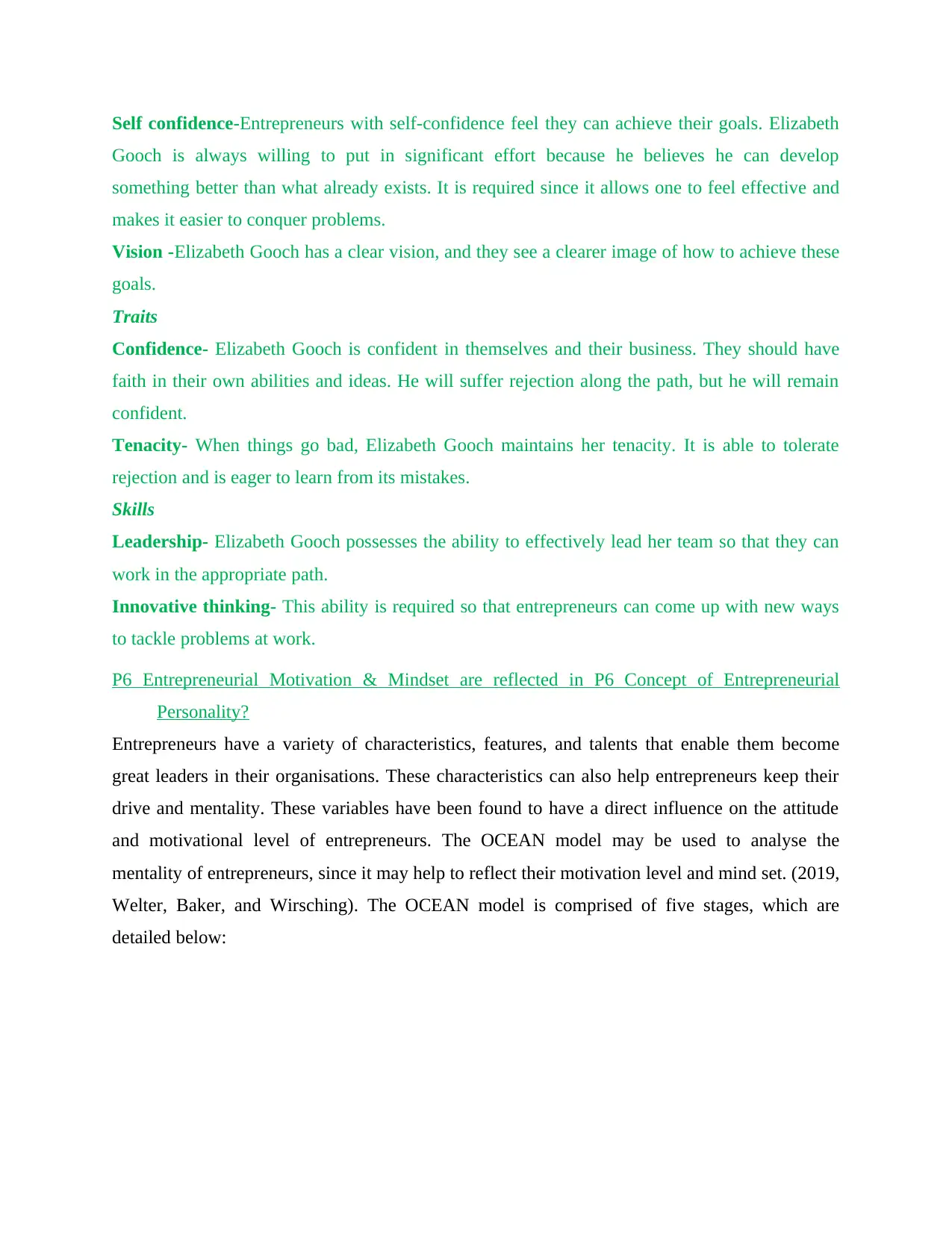
Self confidence-Entrepreneurs with self-confidence feel they can achieve their goals. Elizabeth
Gooch is always willing to put in significant effort because he believes he can develop
something better than what already exists. It is required since it allows one to feel effective and
makes it easier to conquer problems.
Vision -Elizabeth Gooch has a clear vision, and they see a clearer image of how to achieve these
goals.
Traits
Confidence- Elizabeth Gooch is confident in themselves and their business. They should have
faith in their own abilities and ideas. He will suffer rejection along the path, but he will remain
confident.
Tenacity- When things go bad, Elizabeth Gooch maintains her tenacity. It is able to tolerate
rejection and is eager to learn from its mistakes.
Skills
Leadership- Elizabeth Gooch possesses the ability to effectively lead her team so that they can
work in the appropriate path.
Innovative thinking- This ability is required so that entrepreneurs can come up with new ways
to tackle problems at work.
P6 Entrepreneurial Motivation & Mindset are reflected in P6 Concept of Entrepreneurial
Personality?
Entrepreneurs have a variety of characteristics, features, and talents that enable them become
great leaders in their organisations. These characteristics can also help entrepreneurs keep their
drive and mentality. These variables have been found to have a direct influence on the attitude
and motivational level of entrepreneurs. The OCEAN model may be used to analyse the
mentality of entrepreneurs, since it may help to reflect their motivation level and mind set. (2019,
Welter, Baker, and Wirsching). The OCEAN model is comprised of five stages, which are
detailed below:
Gooch is always willing to put in significant effort because he believes he can develop
something better than what already exists. It is required since it allows one to feel effective and
makes it easier to conquer problems.
Vision -Elizabeth Gooch has a clear vision, and they see a clearer image of how to achieve these
goals.
Traits
Confidence- Elizabeth Gooch is confident in themselves and their business. They should have
faith in their own abilities and ideas. He will suffer rejection along the path, but he will remain
confident.
Tenacity- When things go bad, Elizabeth Gooch maintains her tenacity. It is able to tolerate
rejection and is eager to learn from its mistakes.
Skills
Leadership- Elizabeth Gooch possesses the ability to effectively lead her team so that they can
work in the appropriate path.
Innovative thinking- This ability is required so that entrepreneurs can come up with new ways
to tackle problems at work.
P6 Entrepreneurial Motivation & Mindset are reflected in P6 Concept of Entrepreneurial
Personality?
Entrepreneurs have a variety of characteristics, features, and talents that enable them become
great leaders in their organisations. These characteristics can also help entrepreneurs keep their
drive and mentality. These variables have been found to have a direct influence on the attitude
and motivational level of entrepreneurs. The OCEAN model may be used to analyse the
mentality of entrepreneurs, since it may help to reflect their motivation level and mind set. (2019,
Welter, Baker, and Wirsching). The OCEAN model is comprised of five stages, which are
detailed below:
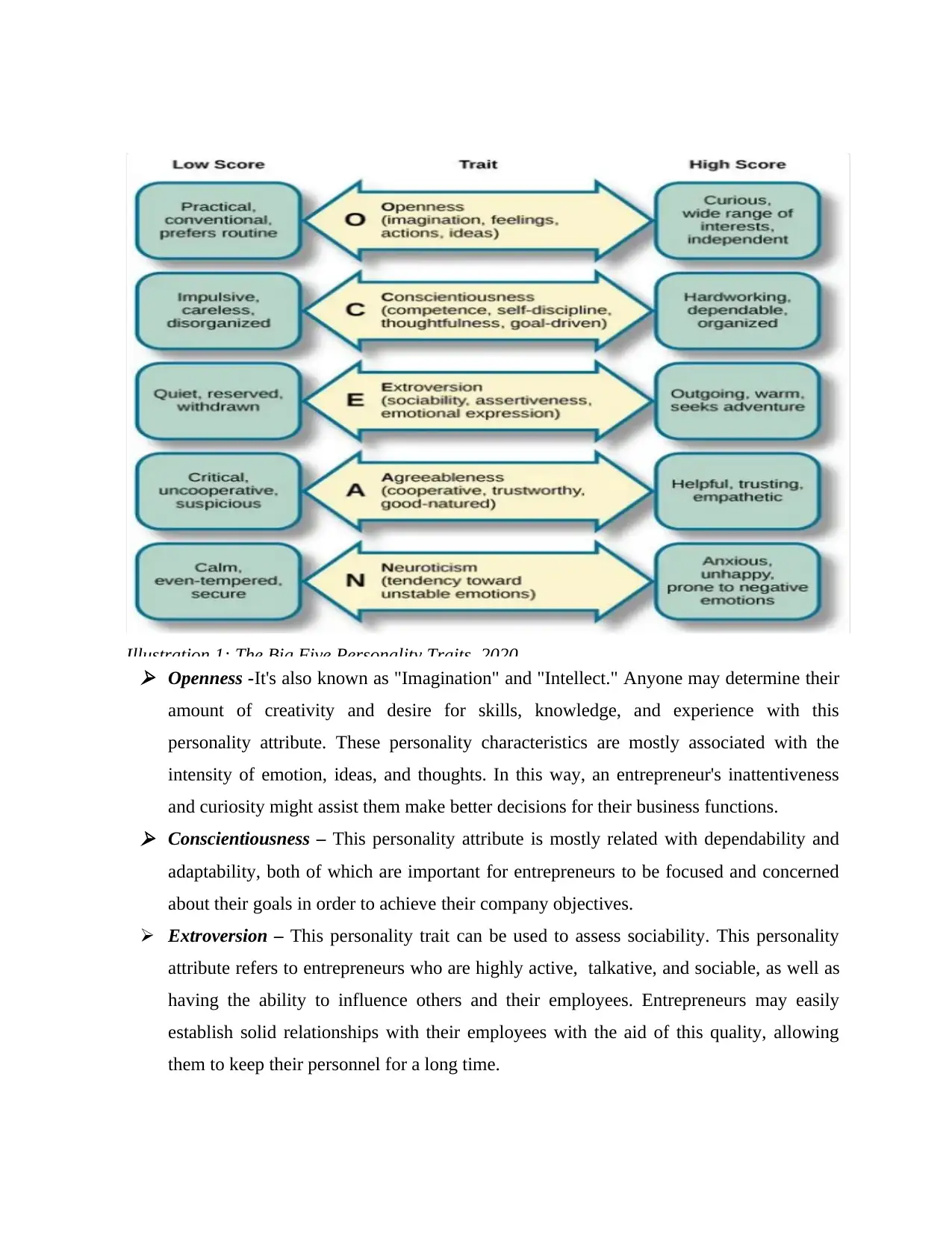
Illustration 1: The Big Five Personality Traits, 2020
Openness -It's also known as "Imagination" and "Intellect." Anyone may determine their
amount of creativity and desire for skills, knowledge, and experience with this
personality attribute. These personality characteristics are mostly associated with the
intensity of emotion, ideas, and thoughts. In this way, an entrepreneur's inattentiveness
and curiosity might assist them make better decisions for their business functions. Conscientiousness – This personality attribute is mostly related with dependability and
adaptability, both of which are important for entrepreneurs to be focused and concerned
about their goals in order to achieve their company objectives.
Extroversion – This personality trait can be used to assess sociability. This personality
attribute refers to entrepreneurs who are highly active, talkative, and sociable, as well as
having the ability to influence others and their employees. Entrepreneurs may easily
establish solid relationships with their employees with the aid of this quality, allowing
them to keep their personnel for a long time.
Openness -It's also known as "Imagination" and "Intellect." Anyone may determine their
amount of creativity and desire for skills, knowledge, and experience with this
personality attribute. These personality characteristics are mostly associated with the
intensity of emotion, ideas, and thoughts. In this way, an entrepreneur's inattentiveness
and curiosity might assist them make better decisions for their business functions. Conscientiousness – This personality attribute is mostly related with dependability and
adaptability, both of which are important for entrepreneurs to be focused and concerned
about their goals in order to achieve their company objectives.
Extroversion – This personality trait can be used to assess sociability. This personality
attribute refers to entrepreneurs who are highly active, talkative, and sociable, as well as
having the ability to influence others and their employees. Entrepreneurs may easily
establish solid relationships with their employees with the aid of this quality, allowing
them to keep their personnel for a long time.
⊘ This is a preview!⊘
Do you want full access?
Subscribe today to unlock all pages.

Trusted by 1+ million students worldwide
1 out of 17
Related Documents
Your All-in-One AI-Powered Toolkit for Academic Success.
+13062052269
info@desklib.com
Available 24*7 on WhatsApp / Email
![[object Object]](/_next/static/media/star-bottom.7253800d.svg)
Unlock your academic potential
Copyright © 2020–2025 A2Z Services. All Rights Reserved. Developed and managed by ZUCOL.





